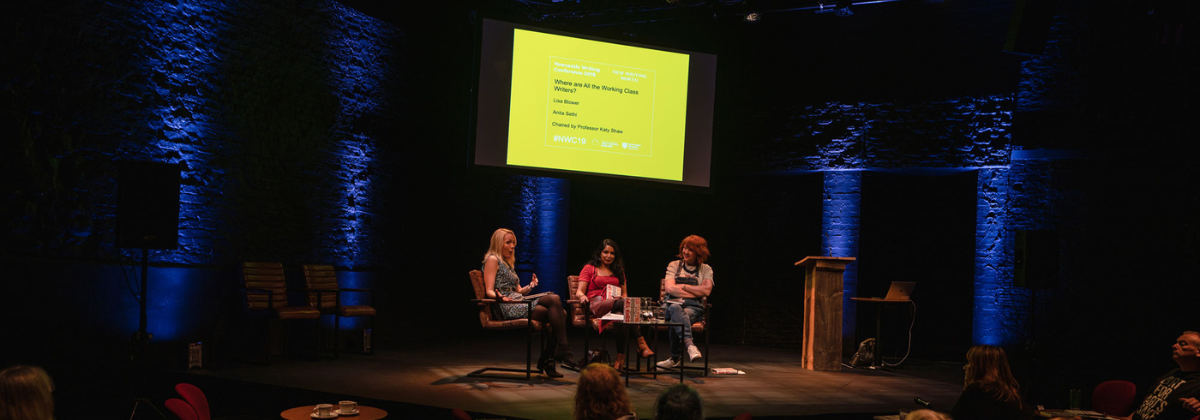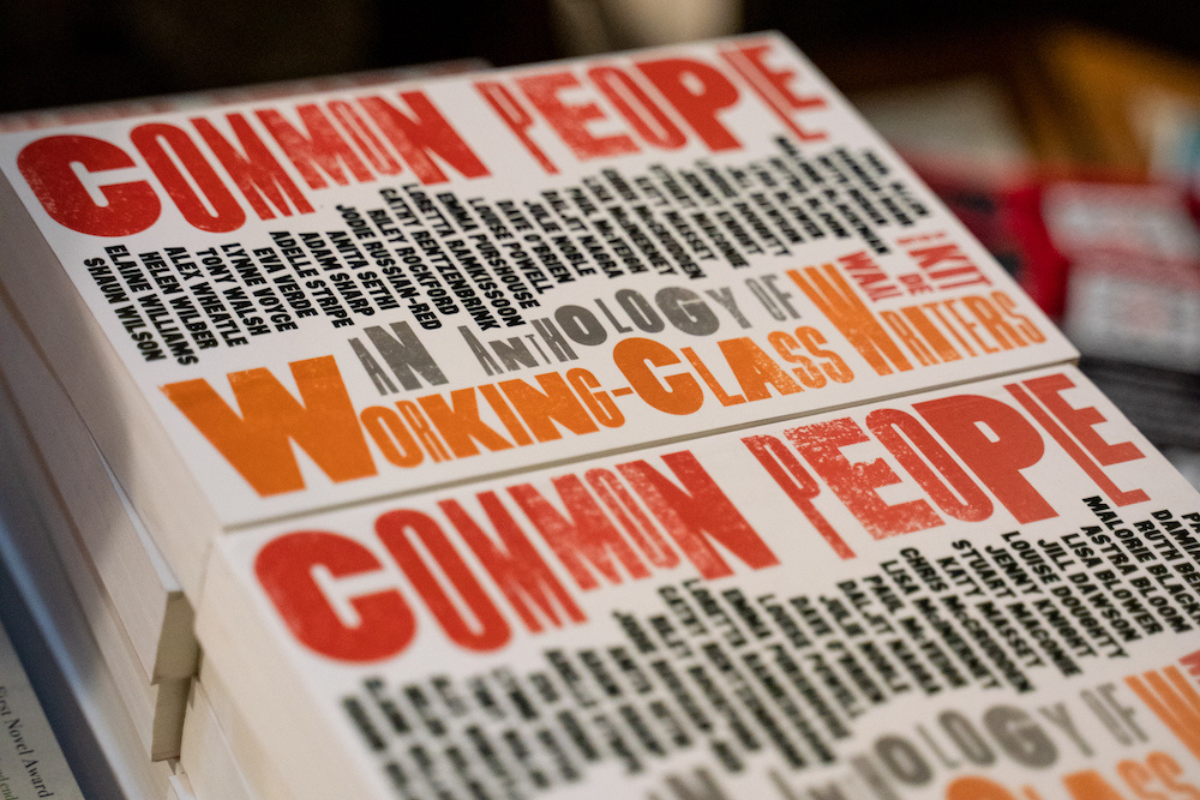Our Partnership with Northumbria University
New Writing North has worked in formal partnership with Northumbria University since 2012. The partnership reinforces already extensive links between the two organisations that each make a unique contribution to culture, creativity, new writing, practice-led research and development in the region and beyond.
Our partnership sets a framework for continued collaboration that reflects New Writing North’s status as a centre of excellence in creative writing and reading and Northumbria University’s mission to make a powerful contribution to cultural and economic development and wellbeing in the region.
Our partnership with the university has creative writing and the humanities at its heart but encompasses activities with many departments across the academic faculty from forensics and policing to law, cultural management and leadership and medical humanities.

Teaching and Learning
New Writing North is excited to be a partner on an innovative and unique Publishing MA at Northumbria University, which has been designed in collaboration with and will be delivered alongside NWN and one of the world’s largest publishing houses, Hachette UK. The Publishing MA has its first intake in September 2022.
New Writing North also designs and co-delivers an industry module as part of the Creative Writing MA programme and we teach on the undergraduate programme in Creative Writing. We also contribute teaching and host student placements from the Cultural Management MA.
We offer a paid 12-month digital marketing internship for a Northumbria graduate every year. We also participate in student employability activities including placements and employability training.
Each year as part of the Northern Writers’ Awards we offer a special award for university students and alumni which sees the winning writer receive on-going support to develop their creative ambitions.
Research and Impact
The Value of Writing: The Northern Writers’ Awards
We have an on-going relationship around research and advocacy with Professor Katy Shaw who has produced a number of published research reports in collaboration with us. We have amplified the impact of this work by working together to initiate new projects and high level advocacy for our research findings. This includes:
In 2018 we worked with Prof. Shaw to evaluate the long term impact of the Northern Writers’ Awards, which over twenty years had supported the work of over 250 writers who all fed into the study. The resulting research report, The Value of Writing, allowed us to see for the first time the long term impact that the awards had on writers, to assess the value for money of the project in terms of wider economic impact, to see how we could improve the scheme and to understand the wider regional and national impact of the work.
In the report Prof. Shaw reflected back to us the status and importance of the awards as part of the regional and national talent development pipeline. Shaw’s insights into the award programme resulted in key changes to our business planning and programme design that led to significant improvements in our performance and provided added value to our beneficiaries.
The outcomes of the report were presented to the All-Party Parliamentary Group on the Performing Arts in the Houses of Parliament as part of an inquiry into effective methods of developing regional talent and enabling social mobility in the creative industries. The report was also the focus of presentations that Prof. Shaw and our Chief Executive Claire Malcolm made at the Northern Lights Conference in Scotland, produced by the Edinburgh International Book Festival and attended by Scotland’s First Minister, Nicola Sturgeon.

Breaking the Class Ceiling in UK Publishing: The Common People project
Launched in 2018 and initiated by New Writing North, Writing West Midlands and the writer Kit de Waal and publisher Unbound, the Common People project aimed to identify new unpublished working-class writers, to create opportunities for these new writers to have their voices heard and their words published, and to offer them professional writing and career development.
Common People brought together all seven of England’s regional writing development agencies: New Writing North, Writing West Midlands, New Writing South, National Centre for Writing, Writing East Midlands, Literature Works and Spread the Word with Northumbria University. The agencies worked collaboratively on the programme supported by a grant from Arts Council England and a crowdfunding campaign run by the publisher Unbound. The project was comprised of two distinct elements: an anthology, edited by Kit de Waal and published by Unbound that profiled work by new and established authors and an accompanying professional development programme to support the new writers involved as they made their debut in the industry.
Throughout the project, Prof. Shaw carried out detailed, empirical research, to interview the writers involved and to track the impact of the project on those participants. Shaw’s work highlighted the barriers that the writers faced, attitudes from the publishing industry towards working class writers and offered compelling reporting of issues that the writers had experienced.
The findings and associated recommendations were drawn together into a wider analysis that formed the basis for a report, Common People: Breaking the Class Ceiling in UK Publishing that was published on May 1st, 2020.
Full details can be found on our showcase of the project, however in brief the Common People report identifies for the first time the pervasive barriers for working-class writers and the intersectionality that impacts alongside class; makes a clarion call for changes in the publishing industry and strongly recommends more effective and better-funded collaborative working across the commercial and subsidised sectors. The report details how the full diversity of voices active in British society is neither heard nor acknowledged in UK publishing today. It calls for the publishing industry to be more representative; to work collaboratively with regional cross-sector partnerships; and for new forms of investment to level the playing field in the regions.
The impact of the Common People report has been truly impressive. The report was the first of its kind carried out on this specific issue and carries much weight and value for those working professionally with writers. Upon launch the report was featured in news items in all the publishing industry newsletters and bulletins, provoked a feature in The Guardian and received write up’s, opinion pieces and commentary in The Observer and many trade and sector news sites. It was shared by prominent writers, commentators and industry professionals and provoked much public debate.
The report was embraced by industry and the arts sector with Sarah Crowne (Director of Literature, Arts Council England) writing ‘this essential report, published during an international crisis, shows the research isn’t less important – it’s more important. It points the way towards the world we must shape on the other side”.
The recommendations of the report initiated real action and developments within industry. Three new businesses have been set up in response for Shaw’s call for more literary agencies outside of London: The Sophie Bradshaw Literary Agency was established by the former non-fiction publisher at The History Press; Laxfield Literary Associates was established by Emma Shercliff, the former Sales and Rights Director for Cassava Republic Press UK and the Liverpool Literary Agency (the first business of its kind in Liverpool, that aims to link northern writers from diverse and under-represented backgrounds to the UK’s ‘big five’ publishing houses) was formed.
The report has been referenced by many industry bodies and organisations including, the Royal Society of Literature and the Authors’ Licensing and Collecting Society who we are now working with on related initiatives for 2021 with. We are continuing to engage with the All Party Parliamentary Group for Diversity in the Creative Industries on how we can further frame the knowledge that the report has generated.
Post Doctoral Students
We have a strong history of collaborating on PhD research projects and hosting students within our organisation. Collaborative studentships include:
This collaborative studentship used New Writing North’s Well Versed programme as a case study for the thesis which aimed to develop understanding of how teachers’ experience of practising creative writing influences pedagogy in schools.
- At the Coalface, sustaining cultural participation in areas of disadvantage and deprivation in Co. Durham
This collaborative PHD is using New Writing North’s small scale theatre touring to libraries and community centres as the case study for this thesis examining Cultural Democracy and access to arts activity.
- Common People: Enhancing the Visibility of Working-Class Writing and Working-Class Writers in the Twenty-First-Century Literary and Publishing Industries.
This is a critical study of the work of a selection of writers featured in the Common anthology, which asks how and why writers are representing 21st Century working class experience in literature.
Civic Engagement
We co-produce a number of public and civic engagement events with the university including Crime Story a unique live event that sees leading forensic, police and legal professionals working together with a live audience to process and solve a fictional crime commissioned from leading writers which have included Denise Mina, Paula Hawkins and Anne Cleeves. We also produce Crime Story branded events such as author events, writing classes and podcasts.
The Newcastle Writing Conference offers a day-long event at which aspiring and early career writers can learn from and network with professionals from the publishing industry.
As part of our relationship Northumbria University sponsor the Northern Writers’ Awards and each year support over 20 writers from across the North to access career development support and professional opportunities to publish their work.


